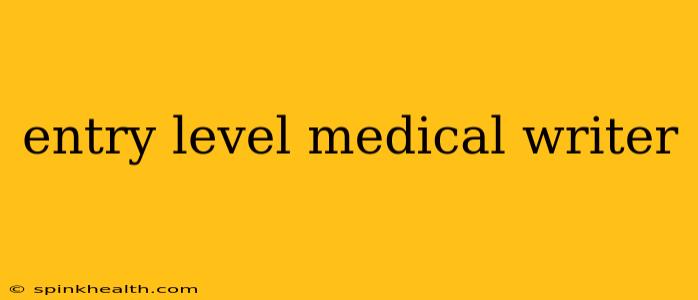The world of medical writing might seem daunting, filled with jargon and rigorous standards. But for those with a passion for clear communication and a knack for translating complex scientific information, it can be a deeply rewarding career. This guide will walk you through the essentials of breaking into the field as an entry-level medical writer. My name is Alex, and I've been a medical writer for over a decade, having started just like you. Let's begin.
What Does an Entry-Level Medical Writer Do?
Many new medical writers start by assisting senior writers on larger projects. This could involve tasks like:
- Literature reviews: Sifting through research papers to find relevant information for a particular document.
- Data entry: Organizing and inputting data into spreadsheets or databases.
- Proofreading and editing: Ensuring consistency in style, grammar, and accuracy.
- Fact-checking: Verifying information against original sources.
- Formatting documents: Preparing manuscripts according to specific guidelines.
While these tasks might seem less glamorous than writing the final product, they are crucial to learning the ropes. Think of it like an apprenticeship – you're mastering the craft before taking on the solo projects.
What Skills Do I Need to Become a Medical Writer?
The key to success in medical writing lies in a potent blend of hard and soft skills:
- Strong writing and editing skills: This is paramount. You need to be able to communicate complex information clearly, concisely, and accurately.
- Scientific knowledge: A strong background in science, particularly biology, chemistry, or a related field, is invaluable. While you don't need a PhD, a solid understanding of scientific methodology is crucial.
- Attention to detail: Medical writing demands accuracy. A single misplaced word can have significant consequences.
- Organizational skills: You'll be juggling multiple projects, deadlines, and sources of information, requiring excellent organization.
- Time management: Meeting deadlines is essential. The ability to prioritize tasks and manage your time efficiently is critical.
- Communication skills: Working effectively with clients, editors, and other members of a project team is crucial.
How Much Does an Entry-Level Medical Writer Make?
Salaries for entry-level medical writers vary widely based on location, experience (even if minimal), and the employer. Generally, you can expect to earn between $40,000 and $60,000 annually, but this can range higher or lower. Building your portfolio and gaining experience rapidly increases your earning potential.
What Type of Education Do I Need?
While a specific degree isn't always required, a background in science, journalism, English, or communications is highly beneficial. Many medical writers hold a bachelor's degree in a related field, but some may pursue a master's degree in medical writing or a related field to enhance their credentials.
How Can I Find Entry-Level Medical Writing Jobs?
Networking is key. Attend industry events, connect with people on LinkedIn, and reach out to medical writing companies directly. Online job boards (Indeed, LinkedIn, etc.) can also be helpful, but remember to tailor your resume and cover letter to each position.
What Are Some Common Mistakes to Avoid?
- Ignoring the importance of proofreading: Always review your work carefully for errors.
- Not understanding your audience: Who are you writing for? Tailor your writing style accordingly.
- Using overly technical language: Aim for clarity and precision, even when dealing with complex topics.
- Missing deadlines: Punctuality is crucial in medical writing.
How Can I Build My Portfolio?
Begin by volunteering to write for non-profit organizations, offering to edit content for friends or family, or creating sample documents. These can be used to build a portfolio that showcases your writing skills.
Breaking into the medical writing field takes dedication and effort, but the rewards are significant. With hard work and a passion for clear communication, you can forge a successful and fulfilling career. Remember to continuously learn, refine your skills, and network – the path to becoming a skilled medical writer is a journey, not a destination.

